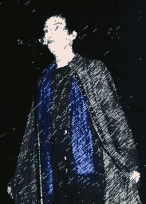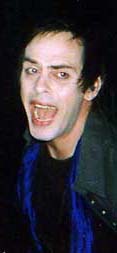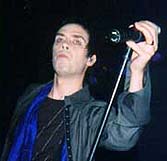 |
Photo
credits:
Alex Crick - photographer
Panda Musgrove - photo processing |
| |
By
J. Kim
June 16, 2002
What
makes Peter Murphy such an enthralling performer are
the dualities and paradoxes that course through his
music and performances. He led the seminal gothic
band Bauhaus through the musical underground of the
late 1970s and 1980s while simultaneously
carving out a new musical genre and encouraging millions
of teenagers to embrace the dark side. Yet as a solo
performer, he does not dwell on the past; the closest
he comes to playing Bauhaus songs at his live shows
are the David Bowie covers (Bauhaus' cover of "Ziggy
Stardust" is arguably their best-known song outside
of the band's followers).
He is proud of his signature voice, but lists himself
as backing vocals on his new album, Dust.
"I
sort of have a little bit of a clever attitude whereby
I imagine people would know who did lead vocals,"
said Murphy in a phone interview during his 2002 U.S.
tour. He quickly points out, however, that he has always
done all his backing vocals.
Cultural influences are also another duality for Murphy.
Born a Brit, he emigrated to Turkey with his wife nearly
10 years ago. The move influenced him profoundly. "I
thought my god we're going to a mystic land and there
the word mystic is a misnomer - there's no such word
mystic, there's just the reality of god which is in
the marketplace...That's what really attracting me to
the Islamic cosmology. It's not an Arabic-exclusive
reality - it's the raison d'etre that manifests in all
creation," said Murphy.
Unlike dwellers of some Muslim countries, the Turks
still consider music an essential element of not only
religion, but also of daily life.
"The
music there is a sort of Arabesque and pop and mixed
with religious music - it's kind of like this marketplace
of life. I was nicely disillusioned and realized that
I could be a rock star and an icon and not change a
dot except that I can refine myself where I'm acting
as a good Muslim," said Murphy.
He immediately recognized how some Westerners, particularly
in the United States, have a dim view of the Muslim
religion. He immediately called Osama bin Laden a "road-raged
Muslim" and insisted that he had abandoned the
essential message of the religion, which Murphy defines
as love.
"Religions
has had a bad name for 2002 years now. Jesus has had
really bad P.R. for a long time. The prophet Muhammed
revered Jesus and confirmed him as the messiah and his
brother," said Murphy who further explained that
when Jesus described the one who will come after me,
which Christians interpret as the Holy Spirit, Muslims
interpret as Muhammad in that Jesus was prophesizing
about Muhammad. He confirmed once again the absurdity
of wars between Christians, Muslims and Jews considering
they all worship the same god only with different variations,
just like one can order the same dish at a Thai restaurant
and have it one star or five star.
Muslim worship music entered Murphy's life via was Kanai
Karacha, whom Murphy calls the Nusrat Fateh Ali Kahn
of Turkey. (Mercan Dede, who played the traditional
Turkish instruments on Dust has compared Murphy to Nusrat
Fateh Ali Kahn as well. Murphy humbly declined the comparison
to whom he calls "the master".) He recalled
listening to zikirs, devotional chants. The theory of
the zikir is that when the chants of remembering of
a quality of God (i.e. love, compassion) repeated, through
the repetition it's really God remembering himself through
the invoker of the chant. Murphy clung to this idea.
 "Also,
the listening of it has an effect and that really sort
of lit a spark in me which is now growing into a blaze
if you like," said Murphy. That blaze inspired
him to create Dust. Murphy's wife directs Modern Dance
Turkey; while listening to a CD for one of her performances,
Murphy discovered the work of Dede and asked him to
play on his new album. Dede had emigrated from Turkey
to Canada several years ago. Murphy jokes he is more
Eastern now than is Dede and Dede is more Western than
Murphy. "Also,
the listening of it has an effect and that really sort
of lit a spark in me which is now growing into a blaze
if you like," said Murphy. That blaze inspired
him to create Dust. Murphy's wife directs Modern Dance
Turkey; while listening to a CD for one of her performances,
Murphy discovered the work of Dede and asked him to
play on his new album. Dede had emigrated from Turkey
to Canada several years ago. Murphy jokes he is more
Eastern now than is Dede and Dede is more Western than
Murphy.
Dede's first step of the collaboration was listening
to the Just for Love album which Murphy recorded on
his last tour. Dede was hooked. "He said it was
the best album he's heard in 20 years and that was all
very nice," said Murphy.
Dede immediately asked if he could revise the songs
"My Last Two Weeks" and "Subway"
and incorporate them into the new album and onto the
album they went. "As was evidenced on the Just
for Love live album, my work seems to have a quality
that can be rearranged in any form because the songs
and the singer is only half of the matter," said
Murphy.
Throughout the production of Dust, Dede kept Murphy's
vocals prominent. The result is the impassioned vocals
of Murphy gliding over Middle Eastern sounds like a
magic carpet. "Just for Love" evolves from
Murphy's powerful sentiment into a wonderful Tabla-driven
trance in the same vein Sky Cries Mary songs would shift
from the simple elegance of Anisa Romero's voice into
a hypnotic and explosive trance. "My Last Two Weeks"
soars in the new version adding yet another paradox
to the mix - it's a seven minute song that the listener
hopes never ends.
While infusing Middle Eastern instrumentation (such
as the Tabla, Kanun and the Classical Kemenche), into
dark rock, they wanted to avoid appearing as the Westerners
coopting a traditional sound from another land then
cashing in on the World Beat boondoggle. He knows if
people want to listen to "ethnic" Turkish
music, they can find Omar Faruk Tekbilek in any major
record store. Dede encouraged Murphy he could create
a fusion without insulting either musical form.
"[Making
this album ]without appearing dilettantish was foremost
in my mind while I've been carrying around this album
in my mind for a number of years. I never felt I could
really make an album that respected the authenticity
of its source and of course Peter Gabriel was always
respectful of that," said Murphy.
Not only has the music of Turkey influenced Murphy's
songs but also has the dance influenced his performance.
The influence of watching his wife's company and classic
bellydancing in Turkey reflects in the intricate articulation
of Murphy's hands, eyes, etc. "I'm quite a sponge
and a bastard Renaissance man. I can really take something
and do my version of it. I'm a little bit like a child
at about 2 years of age who sees somebody dancing and
singing then they start imitating and that's how I see
myself. I'm not a very good academic, so that's how
I learn," said Murphy.
For years, fans have also watched Murphy spin like a
dervish, and bounce around the stage, ricocheting between
joyous celebration and stern contemplation. His trademark
is an exposed lightbulb, which he cradles in his hands,
reflecting light at various angles, playing with the
light like a soundless Theremin. Murphy achieves a rare
performance paradox that Prince has mastered in that
every movement seems both intricately choreographed
and utterly spontaneous at the same time. He creates
a basic structure, for his visual performance, and allows
for improvisation within that framework.
"I
can work in that sort of frame with a vitality that
is always looking for a newness," said Murphy.
"I respect my audience to the extent that they
will know when there's a moment of complacency or sort
of jadedness. I know that, so I'm always trying to transport
myself with the audience while taking the audience with
me."
Murphy enjoys a stronger connection with his audience
than many artists do. While many artists will deign
to slap the hands of a few straining fans, Murphy will
hold his fans hands for several minutes while singing.
"I've
got to keep it where we are all strangers but there's
a very intimate dialogue happening where there's a connectedness.
Every person who has an audience has that, but [the
question is] whether they want to acknowledge it and
make it part of the experience," said Murphy.
Though his shows are intimate affairs, Murphy has an
air of otherworldliness: they may touch him but the
fans never lose sight of their relationship to Murphy
as almost disciples to guru. This dynamic dichotomy
provide the shows with an essential tension. Murphy
considers the guru element a necessary apparatus in
the performance. "When you're listening to something
you must give it complete attention, so I make them
listen," said Murphy.
Not only do they listen, but Murphy listens back. At
his May 19 show in Seattle, WA, he asked the audience
if they had any questions, then passed around the microphone
for an impromptu chat. One audience member asked him,
"What are you trying to do?" to which the
cheeky Murphy answered, "Lose weight, look gorgeous
and sell lots of records." Murphy's fans know there
is much more than that, and it's that very complexity
and depth that has kept them rapt for more than 20 years
while adding new ones at every show.
|
 presents...
presents...
 presents...
presents...